Meet the 2023 ECST awarded Protected Areas!
Oscar Rodbag - Arxiu Parc Natural de l’Alt Pirineu
During a special award ceremony at the European Parliament on the 30th of November, the European Charter for Sustainable Tourism (ECST) certification was (re-)awarded to Parks and Protected Areas.
Creating a sustainable change in tourism
The European Charter for Sustainable Tourism in Protected Areas is a practical management tool that enables Protected Areas to develop and implement sustainable tourism strategies, thus benefitting nature and people, as well as local economies.
This year EUROPARC re-awarded 11, and welcomed 3 new Parks to the Network. The ECST Part I is now 94 Sustainable Destinations from 15 countries strong, with many more businesses and tour operators committed to Part II and III. They are spread all over Europe, but unite around the shared vision to make sustainable tourism a meaningful quality experience, which safeguards natural and cultural values, supports local livelihoods and quality of life, as well as sustainable, regional development.
To become an ECST certified Park, Protected Areas have to go through a certification process that includes both a written documentation of how they are creating sustainable tourism, and an on-site visit by verifiers. Those Parks that are then accepted into this leading Sustainable Tourism network, are officially awarded during a special award ceremony at the European Parliament. In 2023, we were kindly hosted by MEP Tilly Metz of the Greens/European Free Alliance.
The implementation of the ECST is an opportunity to work side-by-side with local business partners and ensure that tourism can bring social and economic benefits to the local community.
The key principles of the European Charter for Sustainable Tourism in Protected Areas are the protection of natural and cultural heritage, participation by all stakeholders, and effective partnership working. It ensures Parks are planning to prepare and implement a sustainable tourism strategy, to realize the environmental, social and economic benefits of everyone working more sustainably.
Europe’s Protected Areas are drivers of sustainable development. For this, a systematic approach to Sustainable Tourism is essential component.
Three new Parks were awarded!
Overall, 14 Parks were awarded in 2023. This includes three new awardees and 11 Parks that have successfully re-applied to the ECST. EUROPARC is incredibly proud to have developed this programme over 20 years ago. It’s a great achievement to see it grow to its current level as the largest network of Protected Area sustainable tourism practitioners.
The continious growth of this network, as well as the large amount of Parks that have recommitted to the ECST, is further proof that Protected Areas are drivers of sustainble tourism and sustainable regional development.
Says EUROPARC Executive Director Carol Ritchie.
Get to know the new awardees here:
Cadí-Moixeró Nature Park
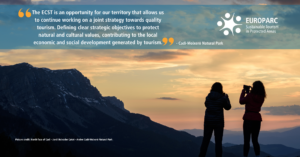
Picture credit: North face of Cadi – Jordi Boixader Catot – Arxive Cadí-Moixeró Natural Park
The Cadí-Moixeró Nature Park in Catalonia takes an all-encompassing approach to Sustainable Tourism: The area focusses on providing public transport, whilst also offering on-demand transportation services for those areas that are not frequented by public transport. Furthermore, the Park collaborates with various pro-inclusion collectives to provide tourism experiences for those with special needs. Through fairs, campaigns and displays, the Park also has numerous actions towards promoting and protecting local producers. These are just a few examples of how the Park is providing a sustainable tourism experience for all!
Sabinares del Arlanza-La Yecla Nature Park
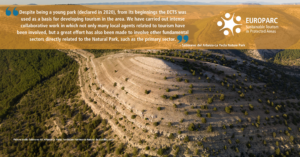
Picture credit: Sabinares del Arlanza-La Yecla_Fundación Patrimonio Natural de Castilla y León
This Spanish Protected Area is home to what can be considered some of the most extensive and best preserved juniper forests in Europe, and potentially worldwide. Despite being a young park (declared in 2020), the Sabinares del Arlanza-La Yecla Nature Park utilized the ECST to develop tourism in the area from its very beginning. The Park in particular focusses on working with businesses wanting to provide sustainable experiences. Furthermore, a positive example of their work is the current development of a volunteer programme which also extends the invitation to towns to participate in tourism volunteer activities.
Alt Pirineu Nature Park
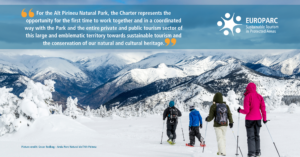
Picture credit: Oscar Rodbag – Arxiu Parc Natural de l’Alt Pirineu
The Catalonian Alt Pirineu Nature Park (PNPA) focusses on nature interpretation, involving visitors in restoration activities, and regulating the flow of visitors in high-frequency areas. The Park is active in a project that encourages visitors to calculate the carbon footprint of their visit and offset it by supporting conservation projects. The Association of Interpreter Guides of the PNPA includes interpreter guides trained and accredited by the Park. It is a good example of the possibilities of joint work between tourist agents and the Protected Area. Furthermore, the Park is also involved in a project to preserve local agricultural varieties. Here, the Park not only involves visitors, but also local residents to plant and monitors the seeds and plants. All this and more convinced the verifiers that the Alt Pirnieu Nature Park was a worthy candidate for the ECST.
11 Parks renewed their dedication to Sustainable Tourism
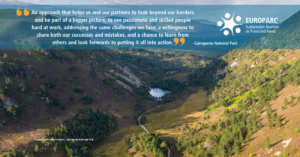
Picture credit: James Shooter, Cairngorms National Park
It’s not just new Parks that were put in the spotlight: 11 Parks also recommitted to the ECST in 2023. These are:
- Paneveggio Pale di San Martino Nature Park (IT);
- Monte Rufeno Nature Reserve (IT);
- Penisola del Sinis Marine Protected Area – Isola di Mal di Ventre (IT);
- Adamello Brenta Nature Park (IT);
- Porto Cesareo Marine Protected Area (IT);
- Transboundary Area: Alpi Marittime Nature Park and Mercantour National Park (IT/FR);
- Kemeri National Park (LV);
- Garraf, d’Olèrdola i del Foix Parks (ES);
- Garajonay National Park (ES);
- Maestrazgo Natural Monuments (ES);
- Cairngorms National Park (UK).
We congratulate all areas, old and new, that have committed to the work of the ECST. The preservation of Europe’s natural heritage relies on good quality, sustainable, tourism, and these Parks are driving this change forward. As a representative of the Kemeri National Park says:
[The ECST is a] Roadmap to genuinely sustainable development, where all parties work together as one team, finding wise ways of using the amazing potential of our natural values to the full extent, without compromising the quality of their existence in the long term.
Are you interested in joining the European Charter for Sustainable Tourism in Protected Areas? Then start the verification process now! All information can be found on the dedicated webpage here:
EUROPARC thanks MEP Tilly Metz of the Greens/European Free Alliance for kindly hosting us at the European Parliament.
EUROPARC Federation is looking for an IVY volunteer!
Banner created by IVY.
IVY is the Interreg Youth Volunteer initiative. The volunteer will support the Interreg project “GREENHEALTH – Sustainable Protected Areas as a key value for human well-being“, under the Programme “Interreg Europe”.
The objective of the Interreg project “GREENHEALTH” is to improve regional public policies and to create the right regional contexts to maximize the links between Protected Areas, health and well-being.
The volunteer will be carrying out the following tasks and activities:
- Preparation of new templates for social media to create some visual diversity without compromising the visual identity of the project (and in line with the branding manual);
- Adjustment of the social media plan and social media posting;
- Creation of content for social media (videos, articles, news, etc);
- Create video content for for the internal and external communication of the project;
- Support in the organisation, design and communication of specific webinars or events linked to the project;
- Support in information sharing with partners.
Other information:
The volunteer would be working in the EUROPARC Headquarters in Regensburg, for 35 hours a week.
Financial support of: 29 euros per day (week-end and holidays included).
Location: Regensburg, Germany.
Start and duration: January, for 6 months.
Languages*: English (C1).
*Please be aware that the languages mentioned are the minimum level of command required.
Website of the Interreg Project: https://www.interregeurope.eu/greenhealth
Where Sports and Nature Meet
Stakeholders from the outdoor sports, education, environment, and EU political sectors gathered in Munich from November 13th to 15th for the closing event of the EU Erasmus+ project – Sustainability and Environmental Education in Outdoor Sports (The SEE Project). The project partners were thrilled to celebrate the completion of four impactful project reports, a European best practices guide, and an Educational Toolkit after three years of hard work.
Make sure to take a peek at our virtual photo album to get a closer look at all the exciting activities that took place at the SEE Symposium:
The learning symposium provided an excellent opportunity for an international audience from both the outdoor sports and environmental protection sectors to come together, share ideas, transfer knowledge, and work on future collaborations.
The two-day program allowed participants to delve deeper into key topics related to outdoor sports and Protected areas.
Interactive and Deep Dive sessions
As part of the Interactive and Deep Dive sessions, participants had the opportunity to exchange ideas on a number of topics, including:
- Community engagement and social conflicts
- Littering
- Nature connection
- Dealing with impacts
- Equipment and consumption
- Overcrowding
- Climbing specific activities
- Values and raising awareness
- Cooperation between Nature and Sport
- Communication
- Inclusion
Participants also got hands-on experience with the Toolkit through several practical workshop sessions, including testing toolkit activities. They also got inspired by inspirational talks from game changers in environmental activism.
New Declaration: Europe’s Nature Regional Landscape Parks unite for Climate & Biodiversity Action!
The NRL Task Force signed the Climate Declaration at the EUROPARC Conference 2023 in The Netherlands. Picture: PDF-Grafie
Europe’s Nature Regional Landscape (NRL) Parks unite to tell policymakers: we are ready to combat climate change, biodiversity loss and habitat degradation! In the NRL Parks Climate Declaration, they underline that the time is now to invest in these Parks to help them reach their full potential for nature & for people.
If not now, then when? If not us, then who?
Climate Change Adaptation in Europe’s Living Landscapes.
Climate change is a major driver of biodiversity loss. At the same time, the loss of biodiversity accelerates climate change processes. Both are major threats to life on earth and must be addressed through international cooperation and joint action.
Across Europe, the vibrant network of Nature Regional Landscape Parks (NRL) is already implementing integrated, forward-looking measures for a sustainable Europe for nature and people.
The resources locked into Europe’s NRL Parks are a crucial component in ensuring a viable climate adaptation and mitigation response at all government levels.
However, on their journey to adaptation and mitigation, the NRL Parks are confronted with various challenges:
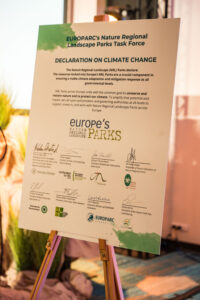
The signed Declaration at the EUROPARC Conference 2023. Picture: PDF-Grafie.
- Strong need to identify the most impactful measures for each context and region to address climate change;
- Limited resources and need for public funding to implement measures;
- Different political and administrative responsibilities for climate protection and nature conservation require a high level of communication;
- Lack of evaluation measures, which assess the existing nature conservation actions being implemented;
- Change of species composition, which leads to a need to identify flagship species and habitats under the EU Birds and Habitats Directives that are most vulnerable to climate change;
- No official functions in the administration processes (e.g. spatial planning) due to limited passage rights on land;
- Conflicting land use objectives (e.g. renewable energies vs. nature conservation or the use of agricultural marginal land for renewable energies as photovoltaic panels, which, however, can often be of high nature conservation value).
For this reason, EUROPARC’s Nature Regional Landscape Parks Task Force developed Europe’s Nature Regional Landscape Parks Declaration on Climate Change. The Declaration was officially signed by the members of the EUROPARC Taskforce for Nature Regional Landscape at the annual EUROPARC Conference 2023 in Leeuwarden, the Netherlands.
NRL Parks across Europe unite with the common goal to conserve, restore nature and to protect our climate. With this declaration, the parks call upon policymakers and governing authorities at all levels to support, invest in, and work with the Nature Regional Landscape Parks across Europe.
With this declaration, NRL Parks manifest their vision and strengths to address both the climate and biodiversity crisis at the same time. Clear action points and needs are defined.
What are the next steps?
To reach their full potential in accelerating climate change actions and combat biodiversity loss, NRL Parks need the support from national and regional policymakers and governing authorities. Driven by the EUROPARC Taskforce for Nature Regional Landscape, the topic will be addressed on national and regional levels. The Taskforce will build on previous work conducted by the LIFE Natur’Adapt project and create synergies with the EUROPARC Taskforce on Climate Change.
